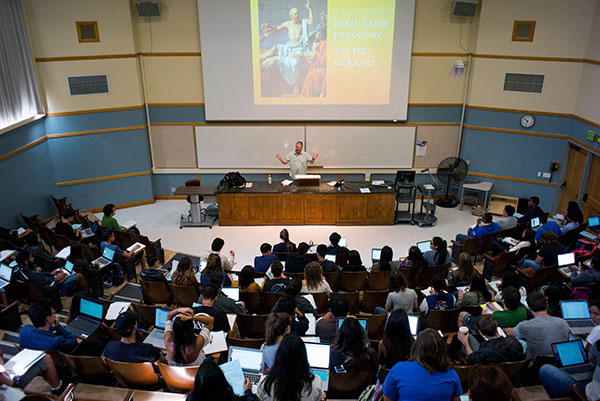By Melissa Anderson

Professor James Lindahl, philosophy and humanities, lectures on Greek philosophers to a class of Humanities Honors program students. (Photo: James Tensuan, ’15 Journalism)
Alisala Nunes, a first-year student, initially wanted to attend a liberal arts school. But when she discovered she could pursue a degree in civil engineering at San Jose State University’s top-ranked Charles W. Davidson College of Engineering and apply for the Humanities Honors program, it seemed like a win-win.
“It was a nice surprise that SJSU had a program like this,” she said.
The Humanities Honors program was founded in 1954 by four professors who combined history, literature, arts and philosophy education into a four-semester program that fulfills many GE requirements while also providing a learning community for students. The students stay together as a cohort for four semesters.
“I’ve made a few friends in my seminar,” Nunes said. “Most friends are from my living situation or major, so it’s nice to have a switch to talk to people who are interested in other things.”
For Nunes, she said the Humanities Honors Program has already begun to teach her the analytic and communication skills she will need for engineering, where she sees the ability to work as team member to be essential.
“I leave every lecture with new ideas and see the interconnectivity of disciplines,” she said. “I see how art, religion, law and culture tie together.”
Professor Cynthia Rostankowski, the coordinator of the program, said the majority of students who enter the program are from non-Humanities majors, such as business, psychology, economics, computer science and others. She noted that the qualifications for the program are within reach of many students, with a requirement that they have a 3.0 unweighted GPA and 550 on the SAT reading/writing section (students can also qualify with select other entrance exams or a 3+ on an AP English exam.)
“A lot of people think it is just for high-achieving students,” Rost
Through the program, students attend a lecture class that is team taught by four professors and then break out into smaller groups for seminar sessions.
Carmel Weiler, a graduate student in philosophy and Rostankowski’s teaching assistant, said she joined the program as an undergraduate. Even though she had to stop out for personal reasons, she said being part of the program helped her resolve to return to her education years later. During her time away from her studies, she kept all her books; they benefited her as she tutored neighborhood kids.
“The program stressed how to write well, and that will help me in the research phase,” she said, as she continues to work on her master’s and plans to pursue a doctorate.
In 2014, the department began offering an Advanced Honors Program that works on the same principles, completing SJSU Studies areas R, S and V. It is a two-semester program that is team-taught and provides a cohort for upper division students who have successfully completed the WST, including incoming transfer students.
Isaiah McNair-Wilson, a transfer student who will be graduating in 2017, said he joined the Advanced Honors Program as he thought it would be “fun to take eclectic classes.”
As a business major with an emphasis in marketing, he said he made many friends in Advanced Honors and has learned a lot about writing. The skills have already helped him as he pens cover letters for his job search.
“The classes teach critical thinking,” he said. “You need humanities courses no matter what field you are in so you understand the environmental and socioeconomic impacts of what you do.”
In addition to the skills and knowledge students gain in the classroom, Rostankowski sa
“At orientation, I ask students if they have heard of the sport of curling,” she said, describing how players move a stone across a sheet of ice. “There is one position called a sweeper who skates backward to clear a path so the stone can slide smoothly to where it is intended to go. I see my work as doing that for students. We need to do what we can to assist students to find their path and thrive.”
2017-18 Humanities Honors Instructors:
Tova Cooper, Humanities
James Lindahl, Philosophy & Humanities
David Mesher, English & Humanities
Johanna Movassat, Art History & Humanities
Kenneth Peter, Political Science & Humanities
Cynthia Rostankowski, Humanities
Jennifer Rycenga, Humanities
Gregory Smay, Humanities
Andrew Wood, Communication Studies & Humanities
2017-18 Advanced Honors Instructors:
James Lindahl
Cynthia Rostankowski